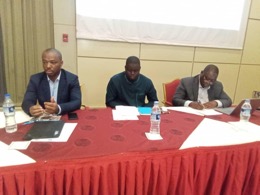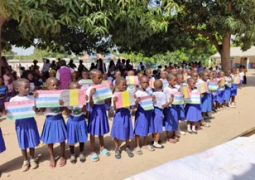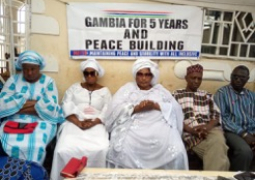
The validation held at the Kairaba Beach Hotel, was financially and technically supported by the National Nutrition Agency (NaNA), Ministries of Health and Basic and Secondary Education, Department of Water Resources (DWR), Water and Sanitation and Hygiene (WASH) project, Child Protection Alliance (CPA) and Child Fund, The Gambia.
N-MODA as widely referred to is a study that examines and analyses overlapping deprivation among children in The Gambia and how these deprivations affect the welfare, growth and the development of children for effective policy intervention by Government and stakeholders.
Thus, it is envisaged that the findings in the study would serve as a source of data 2030 Sustainable development Agenda to measure sustainable development goals.
At the validation, Nyakassi M.B. Sanyang, Statistician General at GBoS, said findings of both the multiple indicators cluster and the Integrated Household Survey suggests that children in The Gambia experienced different patterns of vulnerability which may contain several dimensions such as health, education, water, etc. "Therefore, it serves as a complement to monetary poverty."
He further highlighted that child poverty requires understanding children and what they need to survive and thrive, saying children experience poverty in different ways and therefore their vulnerabilities often deserve special attention and therefore the need for commissioning the study.
"In assuring that the study will help inform better policy formulation by the government and delivery of child friendly programmes by implementing Ministries, Departments and Agencies as well as provide insight on SDG 1."
He reminded that children’s wellbeing has a constant effect on the future of any country and The Gambia is not an exception. Countries cannot attain sustained growth and shared prosperity without investing in their people, particularly their children.
Armand Gnarhore, UNICEF Gambia deputy Representative, said the N-MODA is a policy tool analysis that can be used to qualify and identify child deprivation, noting that it is a key contributor to the equity agenda related to children by providing opportunity to further understand how children experience poverty with primary factors of how they are deprived from human capital development of every country.
He reaffirmed that the report helps them as policymaker, service providers and duty makers to reflect all the time on how their collective investments and support have help children attain their best rights.
“The attainment of those rights is as important to having a productive population that can change the world, particularly the country."
The national multi-dimensional overlapping deprivation analysis, he added, provides new ways of thinking and that it should be preserved as an opportunity to increase not only their investment and support but also to be effective and efficient on how they deliver services for Children in the Gambia.
Alieu Loum, permanent Secretary at the Office of the President, said children are the building blocks of society and that they can do much better for the country if they are not deprived of health, education and nutrition.
Loum asserted that the national multi-dimensional overlapping deprivation analysis provides a right based framework for multi-dimensional child poverty measurement, which use the child rights approaches of looking at whether specific rights are met in several domains anchored in The Gambia
“N-MODA defines child deprivation as the non-fulfillment of child’s Rights in survival development, protection and participation and heightened the determination and resolve Government to address these challenges through appropriate policy measures.”





